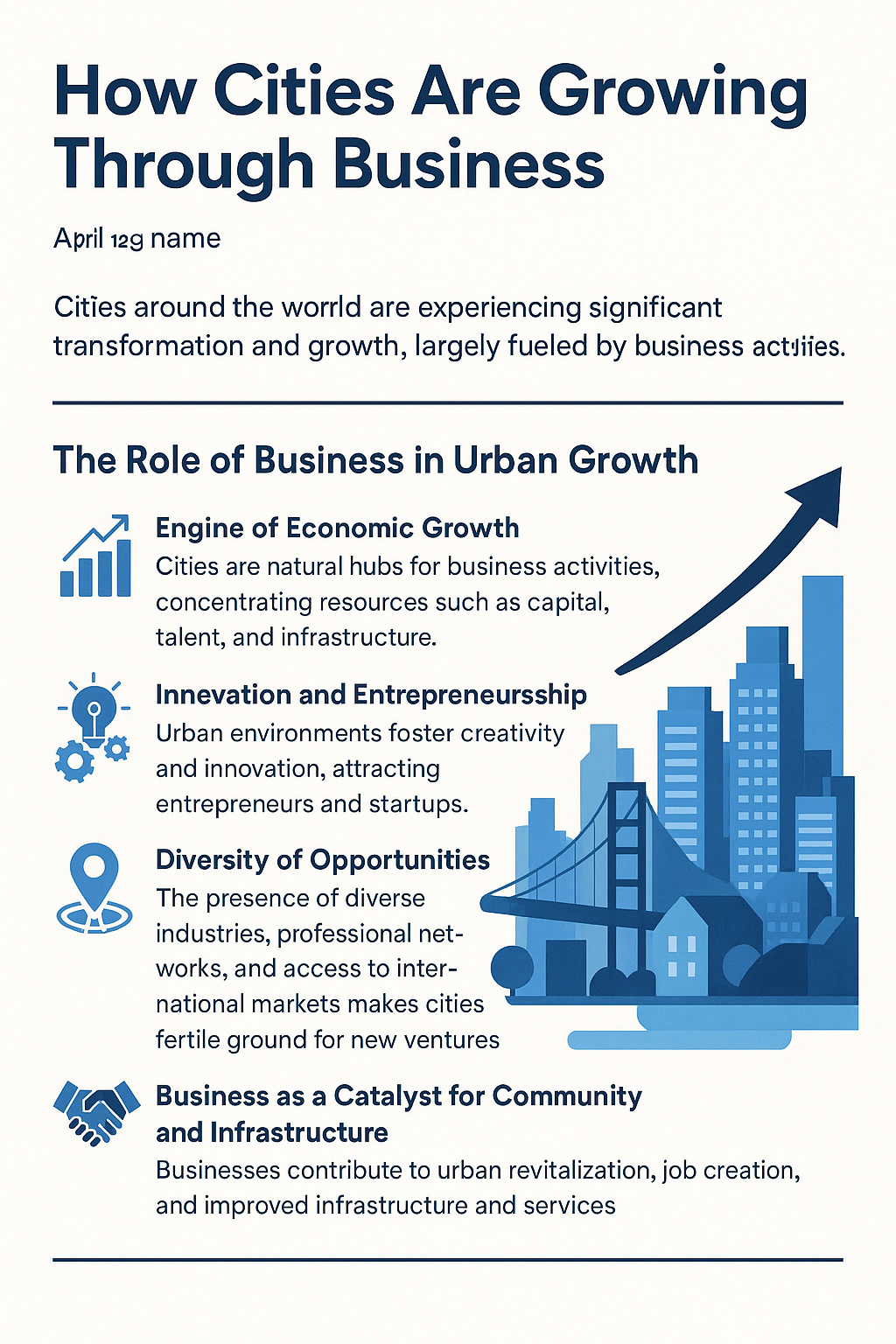Cities around the world are experiencing significant transformation and growth, largely fueled by business activities. Below, you’ll find a detailed overview of how business drives urban development and shapes modern cities.
The Role of Business in Urban Growth
- Engine of Economic Growth: Cities are natural hubs for business activities, concentrating resources such as capital, talent, and infrastructure. Businesses stimulate economic growth by creating millions of jobs, attracting investment, and increasing municipal revenues.
- Innovation and Entrepreneurship: Urban environments foster creativity and innovation, attracting entrepreneurs and startups who leverage the dense networks of people and services. Small businesses and startups often develop organically in response to unmet urban needs, contributing fresh solutions in fields like mobility, housing, food, and digital services.
- Diversity of Opportunities: The presence of diverse industries, professional networks, and access to international markets makes cities fertile ground for new ventures. Business clusters in areas like technology (e.g., Silicon Valley), finance (e.g., London, New York), and manufacturing (e.g., Shenzhen) have transformed entire cities and regions into global economic powerhouses.
Business as a Catalyst for Community and Infrastructure
- Urban Revitalization: Businesses play a crucial role in revitalizing neglected or underperforming urban areas. Investments from businesses can transform rundown districts into vibrant communities, improving local quality of life and boosting economic resilience.
- Job Creation and Workforce Development: Businesses do more than create jobs; they invest in workforce development by supporting training and upskilling programs, partnering with educational institutions, and building career pathways for local residents.
- Infrastructure and Services: Successful businesses drive demand for better infrastructure—leading to improvements in public transport, roads, internet services, and utilities. In turn, improved infrastructure attracts more business activity and new residents, creating a self-sustaining cycle of growth.
- Supporting Local Ecosystems: Local businesses circulate money within their communities, fostering stronger local economies and supporting other urban businesses. They are integral to neighborhood character and resilience, offering unique services and building community ties.
Technology and Smart City Initiatives
- Digital Economy: Technology companies establish vibrant “innovation ecosystems” in many cities, creating new platforms, services, and employment opportunities. The rise of smart cities—with initiatives focusing on data analytics, connectivity, and automation—attracts high-value businesses and skilled workers.
- Sustainable Urbanization: Entrepreneurs and companies increasingly focus on addressing urban challenges such as affordable housing, sustainable energy, and efficient transport through business models that prioritize social and environmental impact.
Public-Private Collaboration
- Strategic Partnerships: City governments often collaborate with businesses to co-design urban policies, development projects, and innovation hubs. Public incentives like tax breaks, grants, and infrastructure investments support business attraction and expansion, which benefit the city as a whole.
Real-World Examples
- Vietnam’s Ho Chi Minh City: Transformed into a global commercial hub by attracting multinational businesses, developing new infrastructure, and fostering regional business networks.
- Silicon Valley, USA: Clusters of technology companies have combined to create an innovation powerhouse, generating extensive employment and transforming the region.
- Medellín, Colombia: Transitioned from a manufacturing hub into a center for innovation, thanks to business investments, public-private partnerships, and entrepreneurship.
Future Outlook
As global urbanization accelerates, cities will continue to rely on business for growth and resilience. The interplay between business innovation, public infrastructure, talent attraction, and supportive policy ecosystems will define the next generation of thriving cities.
Cities that effectively nurture local businesses, attract global enterprises, and leverage technology are best positioned to offer opportunity, prosperity, and quality of life to their residents.



